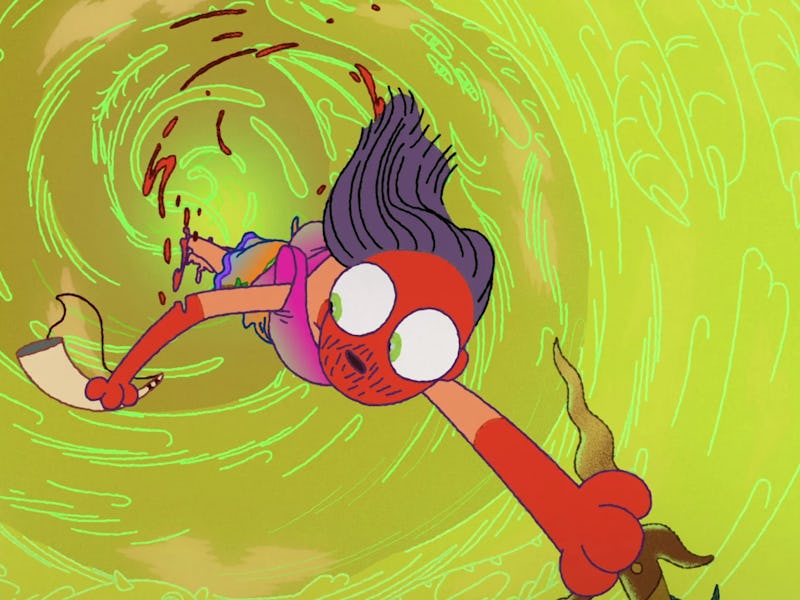Duncan Trussell explains The Midnight Gospel's trippy ending — sort of
“I can only give you my own opinion."

To say that The Midnight Gospel has a plot is a bit of an overstatement. The new Netflix show, from Adventure Time's Pendleton Ward and podcaster Duncan Trussell, features a series of trippy animations backed by repurposed audio from Trussell's popular podcast. That said, this story of a "space caster" named Clancy does eventually build to some sort of narrative, which begs the question: What exactly happens at the end of Midnight Gospel's first season?
To find out, Inverse asked Trussell himself, and while the show's co-creator couldn't give us a straight answer for several reasons, he did offer some interesting context for anyone currently grappling with Midnight Gospel's trippy ending.
Warning! Spoilers ahead for Midnight Gospel. Seriously, stop reading now if you haven't finished Season 1 yet.
“I can only give you my own opinion on it and not Pendleton’s.”
Throughout Midnight Gospel, we get brief glimpses into Clancy's actual life: A dead father, an estranged sister. Then, in the Season 1 finale, we get an extra-long episode devoted to Clancy's mom (voiced by Trussell's own mother) as the two of them grapple with life, death, and the meaning of the universe. In the end, Clancy seems to get some closure on the realization that his mom will eventually die. He then boards a bus full of characters from previous episodes and asks out loud, "Am I dead?"
Clancy interviews Death in 'Midnight Gospel.'
That's the end of Midnight Gospel Season 1. So when I had a chance to speak with Trussell directly, it was one of the first things I asked. Unfortunately, he couldn't answer, at least not definitively.
"They [Netflix] haven't even said if they want to Season 2 or anything like that, and I can only give you my own opinion on it and not Pendleton's," Trussell tells Inverse.
Fair enough. And while we sincerely hope Netflix picks up Midnight Gospel for a second season, we're also thankful that Trussell was able to offer an answer of sorts of Season 1's biggest question: Is Clancy dead?
In keeping with the style of Trussell's own long-form podcast, here's his full, unedited answer:
I love that question. I think it's one of the most important questions of the show and I'm trying to think of a way that I could answer that ambiguously so that you could use it. You know, I think a really important question, a lot of people are afraid to die, and rightfully so, but a lot of times people do, are afraid to die. And by people, I mean me.
There was a point where I don't think I'd really asked myself if I was even alive, if I'd even, you know, figured out what — outside the biological definition of life — is it that makes me a me. What is it that's holding the framework of my personality together?
There's this book by Marcus Aurelius called Meditations, which has an essay on death. And in it, he makes the astounding point that anything prior to this moment is already gone. And clearly, you don't know what's coming next. There's no way you could predict the next few moments or you would be Nostradamus or something like that.
So when people worry about death, it's as though they've forgotten that they already died with every breath. Everything that used to be is gone. It's gone. It's wiped clean. And it's stored in some kind of neurological hard drive in our skulls. But as far as the events themselves, in all those moments that seems so important, It might as well have been a dream. I'm deeply paraphrasing Marcus Aurelius by the way.
So to me, when it comes to the idea of beings living inside of a simulator or simulation theory itself, what I love about it is it invites us to ask the question: Are we real? Are we alive? Is this actually happening. And if it is, how do we know for sure? And so that's my ambiguous answer to your question.
“When people worry about death, it's as though they’ve forgotten that they already died with every breath.”
Midnight Gospel is streaming now on Netflix.